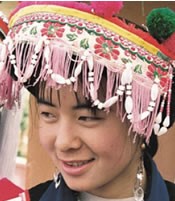Gaisu, Southern in China

Photo Source:
Copyrighted © 2026
Operation China, Asia Harvest All rights reserved. Used with permission |
Send Joshua Project a map of this people group.
|
| People Name: | Gaisu, Southern |
| Country: | China |
| 10/40 Window: | Yes |
| Population: | 48,000 |
| World Population: | 48,000 |
| Primary Language: | Chinese, Mandarin |
| Primary Religion: | Ethnic Religions |
| Christian Adherents: | 0.30 % |
| Evangelicals: | 0.00 % |
| Scripture: | Complete Bible |
| Ministry Resources: | Yes |
| Jesus Film: | Yes |
| Audio Recordings: | Yes |
| People Cluster: | Tibeto-Burman, other |
| Affinity Bloc: | Tibetan-Himalayan Peoples |
| Progress Level: |
|
Introduction / History
As the various Yi groups splintered into smaller units, they moved southward from their original homeland near the juncture of today's Sichuan, Yunnan, and Guizhou provinces. The Southern Gaisu claim they entered their present location from Luxi and Muli counties to the north of where they now live in Honghe Prefecture.
The Southern Gaisu are one of approximately 100 Yi subgroups in Yunnan Province. They are not the same as the Western Gaisu who speak a completely different language. Neighboring minority groups have a host of names for the Southern Gaisu, including Bailili, Bai Lisu (White Lisu), and Luozu. Most Gaisu are highly assimilated into the Han Chinese cultures and languages.
What Are Their Lives Like?
The Southern Gaisu observe the Tenth Month Celebration, held to celebrate the end of the harvest season. They sacrifice a pig to honor their ancestors and seek the blessing of the spirits for the upcoming year. They also celebrate the Torch Festival, common among many Yi groups in southern China. The Torch Festival is an occasion for relatives to get together and socialize. Events include bullfighting, wrestling and singing.
What Are Their Beliefs?
The Southern Gaisu are polytheists; they worship many deities, ghosts and spirits. Days are set aside for the worship of the spirits. Ancestor worship is also widely practiced by the Southern Gaisu. Food is prepared and placed before pictures of dead family members. The Southern Gaisu observe many superstitions. They believe the manner in which guests eat and the way they leave their plate and chopsticks may bring a curse on the host family. Many of the younger generation are atheists. Most Southern Gaisu have been assimilated into Han Chinese culture.
Only a relative handful of Southern Gaisu are Christians. Few missionaries focused on them in the past. There is a great need for devoted and love-filled laborers to take the Southern Gaisu into Christ's light.
What Are Their Needs?
The Gaisu need support for the Christ-centered movements already in place in their part of China. They need outreach that is catered to them and the language they are comfortable with.
Prayer Points
Pray for strong workers in their communities and real movements towards Christ.
Pray for good health, and for the Gaisu families to know they have the protection of God.
Pray that they connect with each other and with Jesus.